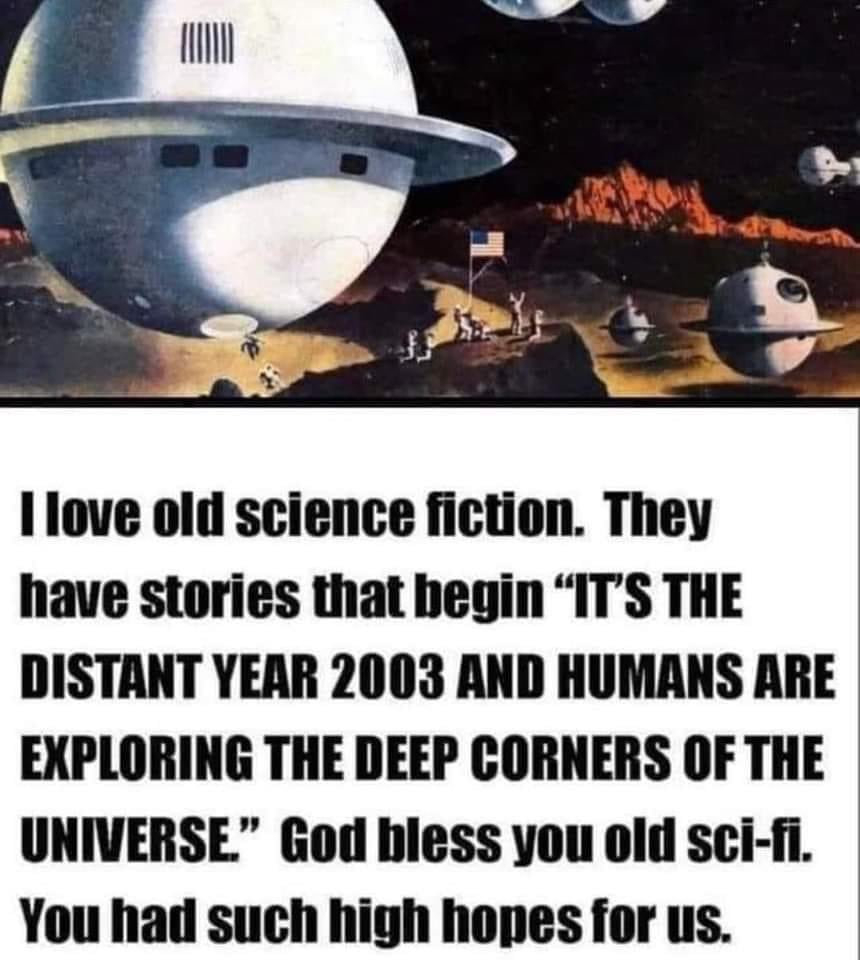this post was submitted on 11 Apr 2024
1530 points (99.2% liked)
memes
10922 readers
3260 users here now
Community rules
1. Be civil
No trolling, bigotry or other insulting / annoying behaviour
2. No politics
This is non-politics community. For political memes please go to !politicalmemes@lemmy.world
3. No recent reposts
Check for reposts when posting a meme, you can only repost after 1 month
4. No bots
No bots without the express approval of the mods or the admins
5. No Spam/Ads
No advertisements or spam. This is an instance rule and the only way to live.
Sister communities
- !tenforward@lemmy.world : Star Trek memes, chat and shitposts
- !lemmyshitpost@lemmy.world : Lemmy Shitposts, anything and everything goes.
- !linuxmemes@lemmy.world : Linux themed memes
- !comicstrips@lemmy.world : for those who love comic stories.
founded 2 years ago
MODERATORS
you are viewing a single comment's thread
view the rest of the comments
view the rest of the comments

Sci-fi is merely a mirror upon society. Hopeful times? Hopeful sci-fi. Dark times? Dystopian sci-fi.
In my mind, I've always suspected the reverse!
Scary times: people would gravitate toward comforting, optimistic media
Comfortable times: people would find dystopian, edgy media more appealing
I wonder if anyone has done a study on this before.
I think it more correlates to the setting.
In dark times, many stories may take place in a dark society or similarly dark theme, but with a story that turns out hopeful in the end. Other times the story might be told in a way to try to emphasize a certain part of life at that time. The darker media becomes more relatable and understandable in darler times. So the older sci-fi that has humanity doing crazy feats in years that have already past exist because the world was a genuinely happier and more hopeful time in the past.
Take the 1982 anime Super Dimension Fortress Macross, for example. Written in the early 1980s in Japan, they wrote that in 1999 a global war would be ended by a spaceship crashing on Earth, with all governments combining into a single Earth government to study the crashed ship in 2001. By 2009, (yes, in only 10 years) humanity is supposed to have learned so much from that ship that they have advanced to building transforming bipedal F-14s that can fly in space, and having restored said spaceship that crashed earlier, faster than light warp technology. This story was written while Japan was experiencing an economic boom, and things were pretty hopeful in Japan until the market crash of 1992. But the story is not about humanity achieving these technological feats, all that is explained in episode 1. The story is about humanity's battle with alien invaders, and the realization that the aliens aren't as alien as humanity thought, and how differences between cultures often result in war that is entirely unnecessary. I imagine if this story was written in 1992 or 1993 when the Japanese economy crashed, it likely would have been significantly darker in setting and tone.
I can't quote a study, but I did read the book Germs Genes and Civilizations. The author observed that the power of the church grew during situations like the Black Plague or the 30 years war, and waned during the Enlightenment.